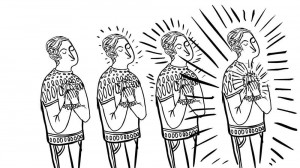New Swedish religion gets file-sharing right
In America, sharing files is a criminal act. In Sweden, the practice is now a religious experience.
Last month, Sweden officially recognized The Missionary Church of Kopimism. The religion sees all information as sacred; thus, file-sharing is a holy act. The founder, Isak Gerson, hopes Kopimism’s followers will one day have the freedom to transmit copyrighted information without “fear of persecution.”
Kopimism makes the SOPA protests look tame. Wikipedia might have shut down for a day, but it doesn’t have any disciples.
Still, as whacky as Kopimism sounds, the church is a legitimate manifestation of our generation’s shifting concept of ownership.
Kopimism was founded by a 19-year-old philosophy student. Like us, he’s used to having megabytes upon megabytes of information at his fingertips; he’s used to accessing images, texts and sound with little to no restriction.
The way Gerson sees it, sending a file isn’t committing a crime. At best, it’s spreading knowledge. At worst, it’s harmless sharing. Anything from a stick figure sketch to a full-length film is fair game.
Moreover, people who have this mindset make almost no distinction between finished products and creative tools. A song is just a jumping point for another tune, and every video merits a spinoff. Everything can be remixed.
Governments all over the world are trying to curb file-sharing. Even if SOPA never passes in the United States, legislators agree that they have to stop piracy.
But file-sharing doesn’t have to be a problem in the first place. What if copyright laws are just outdated?
Copyright laws exist to protect creators from imitation and ensure that they get rewarded for their work. The laws are supposed to foster innovation. Lawmakers assume that if creators know they’ll receive recognition and money, they’ll be more likely to create.
That assumption is by no means unfounded, but it doesn’t account for the thousands of people who generate content on the Internet.
Most bloggers are unpaid. Many photographers on Flickr share their photos with the public without asking for attribution. Plenty of programmers have left their mark on open-source software, knowing they won’t get credit or cash.
The real joy of creating is seeing one’s vision come alive, not getting a check in the mail.
Defenders of the current copyright laws would counter that many people depend on them for their livelihoods.
The big Hollywood studios that rallied for SOPA are — in spite of their complaints — raking in more money than ever. But artists, writers and inventors who operate on a smaller scale don’t make such huge profits. They pay the bills by getting paid for their work.
In all honesty, I don’t have a solution for these creators. I don’t know how to protect them from millions of Internet users. All I know is that it’s an impossible and fruitless task.
Unless the United States wants to track every citizen with the intensity of a totalitarian government, people will continue to send each other copyrighted material. This generation’s attitude toward file-sharing isn’t going to change.
Ultimately, lawmakers and businesses are the ones who need to adjust themselves to our attitude shift.
Journalists are already trying to change the way they make money. The television, movie, music and tech industries should also start rethinking their revenue models; otherwise, people will start calling them dying industries too.
Is Gerson’s religion an elaborate practical joke? Possibly. But whatever his intention is, Kopimism already has more than 3,000 followers.
Maybe you’ll be next.
Maya Itah is a senior majoring in communication. Her column “Tackling the ‘-Isms’” runs every other Thursday.


Many egregious abuses are conducted by means of copyright. Aside from making people like Chaim Saban a Hollywood billionaire able to quash Oliver Stone’s humanized portrait of Hitler in “The Secret History of America” (the Showtime miniseries you’ll never see), it is the means by which the government of Germany (Bavaria, actually) has prohibited reprintings of “Mein Kampf,” and will continue doing so at least until 2015 (70 years after the author’s death).
Such acts are an affront to MY religion. So if you happen to disagree with me about any of this, do so with the utmost sensitivity, please.